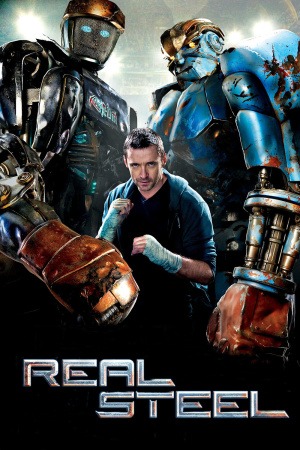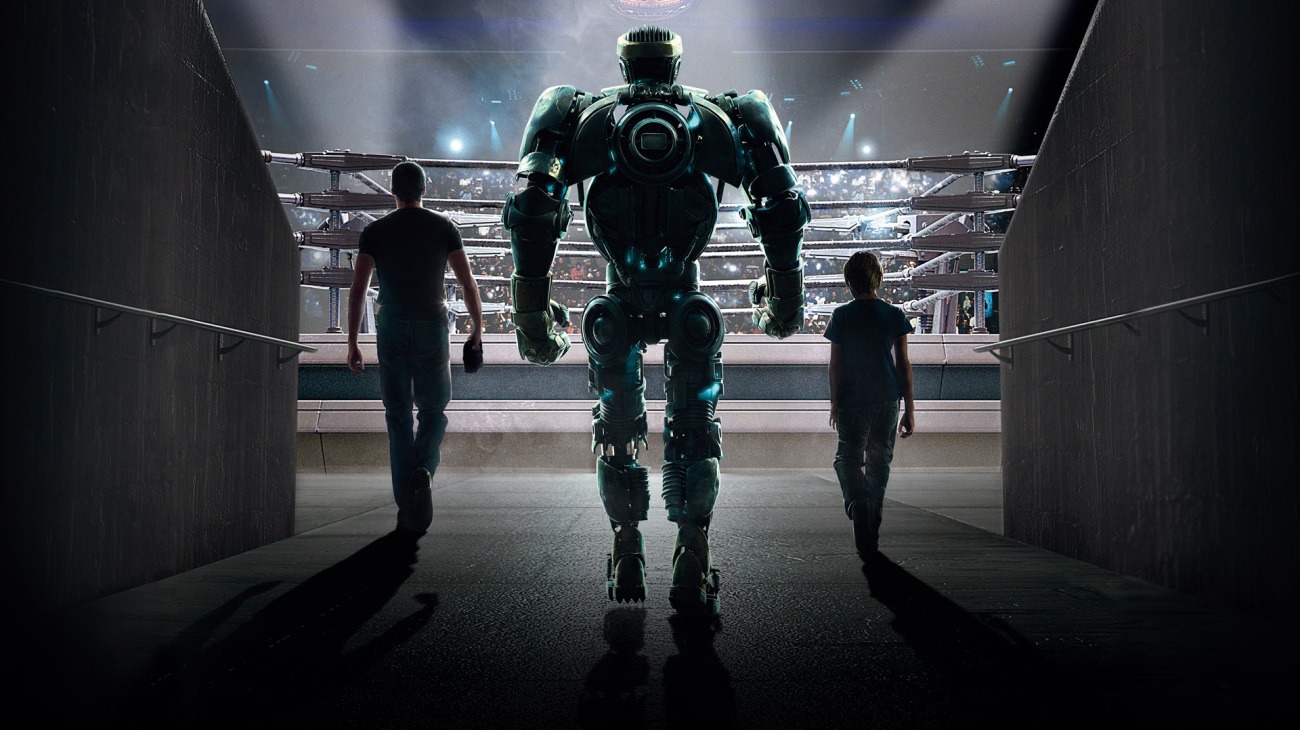
Bad robots
I am ashamed to say that I didn't make the connection that Real Steel is nor more nor less than Rock 'Em Sock 'Em Robots: The Movie until every other living person had already done so. But in my defense, that is only because I very early on got attached to thinking of it as a stupider version of the already stupid Robot Jox, on account of the earlier film having a similar premise (in the future, the most popular sport is matches between battlebots...) with an even higher concept behind it (...that are fighting World War III by proxy!). It is best, however, not to get too hung upon this and lose sight of the real subject at hand: Shawn Levy can jump up my asshole.
Levy, as you may already know if you are an unhappy person with bad luck, is the director of, actually, a hell of a lot of things, but some of the most noteworthy are Night at the Museum and its tar-sucking sequel; the distasteful remake of Cheaper by the Dozen; and the ball-shriveling remake of The Pink Panther. Despite this, as thoroughly undignified a filmography as anyone could possess who hasn't made at least one video game adaption,* I somehow had managed to avoid the obvious conclusion that Levy himself was a terrible director. Lord knows, he's not a good director. But something about him screams "impersonal hack!", not "incompetent clown of Uwe Boll proportions!"
Real Steel isn't the work of a hack. It's the work of somebody who either doesn't know how to make movies, doesn't care, or is so appalled by the quality of scripts he is customarily given that he's trying to blow up the film from the inside. There is a shot in the first 10 minutes of the film, in which Hugh Jackman and Evangeline Lilly share a close-up. Or, it's a two-shot, but just of their heads. My God, it's such a terrible shot that I don't even know how to explain what it is. Anyway, Jackman has a good foot on Lilly, so this tight framing of the both of them works something like this: on the left, the frame slices the top off of Jackman's head - that's okay, it's a fair convention in shooting human beings. On the right, the frame is right at her neck. I mean, right at her neck. Nobody, looking at this shot, could fail to think that Evangeline Lilly's disembodied head is just floating there, chatting with Hugh Jackman. It is one of the most outrageously poor compositions I have seen in a major studio film in, maybe, years - it got into a movie that cost $80 million and was executive produced by Steven Spielberg, and it looks like the very first picture your grandma took with her new digital camera. The best case scenario - the best - is that Levy only "let" this happen, and that Academy Award-winning cinematographer Mauro Fiore is the culprit. Otherwise, the only possibility is that the two men were staring at a monitor, saw this happen, and both said, "I absolutely like this, and am totally okay with what it communicates visually".
Incidentally, this shot is not the reason it became clear to me that Levy is an asshole who hates good movies: that happened when the film started oh-so-sensitively and meaningfully - this film about boxing robots - with Alexi Murdoch's brutally over-exposed "All My Days" playing under the opening credits. All four fucking minutes and 50 fucking seconds of it.
Real Steel isn't, as a whole, as bad as that shot - it's almost impossible to imagine that it could be - but it's awfully tedious and ill-made. The plot is a slurry of lots of things: in 2020 (a date mentioned super-casually, and just twice, in the same scene), the most popular sport in America is robot boxing, which consists of controlling robots manually, rather than building robots that can of their own volition perform the motions of fighting. It is, in fact, spectator Street Fighter II, and it is now more popular than football. Also, I do wonder how it is that Levy and writers John Gatins, Dan Gilroy, and Jeremy Leven (the latter two of whom only worked on the story) suppose that this kind of technology is going to be so advanced nine years from now (and with the economy where it is!) that seemingly-advanced robots can be discussed as though their heyday was two or three years in the past, and have at least, I'd guess, five or six generations of the technology: if it's a satire of our "get the brand newest iteration iPad right this exact damn second" consumer culture, my hat is off to the filmmakers, except I have no hat because if that were really what they intended, then I would have eaten my hat. Also, there is not a single element of society other than robots and phones that seems to be even marginally advanced from 2011 to 2020.
In this world, Charlie Kenton (Jackman) is a down-on-his-luck boxer turned robot handler turned washed-up hustler. His only buddy is the cute daughter of his old trainer, Bailey Tallet (Lilly); he is in debt to bookies here there and everywhere; and he's just found out that his now-dead ex left behind a boy, Max (Dakota Goyo). The kid's wealthy aunt, Debra (Hope Davis, who is so far above the mewling role they give her that I have to assume that blackmail was involved), wants to adopt him, but her drippy husband Marvin (James Rebhorn, speaking in a nasal whinge that would have gotten him saddled with a name like "Thadbury Macintosh III" in a '30s screwball or an '80s sex farce) doesn't want to derail their European vacation, so he pays Charlie a huge sum of money to a) give up his custody rights, and b) watch Max for the summer. Shockingly, this results in Max finding a beat-up old robot, and forcing Charlie to help him restore it, and then they take the robot, Atom, on the road, and win lots of money and repair their father-son relationship, and then a tragic break happens just before Atom gets to fight for the title as the scrappy underdog against a titanic robot named Zeus who is, in a possibly questionable aesthetic decision, black.
Working under the Spielberg aegis, it's no surprise that Levy has produced, in essence, a fake Spielberg film; and being Shawn Levy, it's no surprise that he's done a terrible job of it. The worst bit is that the mending of Charlie and Max's relationship is stated rather than shown: since they manage to be a great team as robot fighters, they love each other now, with everything else sort of being ignored. Huge plot points are made a big deal about, and then dropped (there is a whole entire scene whose single purpose seems to be implying that Atom is self-aware, not even the slightest mention is made of this idea for the rest of the movie. And I don't even want to bring up that the ending does not, in fact, resolve the biggest conflict of the plot whatsoever, which is that Charlie has signed away his parental rights even though he and Max are a great father/son team, while Debra and Marvin are hilariously awful rich people). It's ugly: color-corrected with a great deal of energy but no sense, mixing color temperatures indifferently. And anyway, we don't need another Rocky, not even a sci-fi one. Some stories truly can only be told so many times.
Still, the visual effects are absolutely great (the robots are an invisible blend of CGI and practical models), and when the robots fight each other - which does not happen nearly often enough, especially given the film's dumbfoundingly indulgent 127-minute running time - it's easy to tell what's happening. At the very least, then, it's better than Transformers. I fear that if I lower the bar any further, I shall pinch my toes.
4/10






